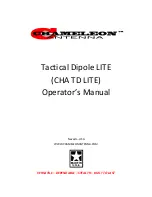
CHA TD LITE
Page 9
Site Selection and Preparation.
1.
Select a site to deploy the CHA TD LITE
Horizontal Dipole configuration, see figure (3).
A good site should have two trees or other
supports that are 120 feet apart and are tall
enough that the ends of the antenna will be at a
height of around 25 feet. The best site will have
an additional support for the center of the
antenna. If the right supports are not present,
any convenient objects, such as fence posts or
the tops of vehicles, may be used as a field
expedient support with reduced performance.
2.
If not already attached, connect a Carabiner (d)
to the Wire Connector (k) ends of the Antenna
Wires.
Connect the Matching Transformer. Refer to figure
(2) for steps (3)
–
(7).
3.
Connect the Carabiner from the Wire Connector
end of an Antenna Wire to the Transformer
Eyebolt (j).
4.
Connect the Wire Connector from the Antenna
Wire to the Bottom Transformer Connection (i).
Tighten the wing nut finger tight.
5.
Connect the Carabiner from the Wire Connector
end of the other Antenna Wire to the Carabiner
from step (3).
6.
Connect the Wire Connector of the Antenna
Wire to the Top Transformer Connection (h).
Tighten the wing nut finger tight.
7.
Connect the UHF Plug from the Coaxial Cable to
the UHF Socket (g) on the Matching
Transformer.
Extend the Antenna Wires.
8.
Fully extend both Antenna Wires in a straight
line in opposite directions along the ground.
9.
Using a throw weight or some other method,
loop the Paracord over the end supports.
10.
Using a Bowline or similar knot, tie a long length
(around 50 feet) of Paracord to the Isolation
Loops (c) at the free ends of the Antenna Wires.
11.
If a center support is available, use a Bowline or
similar knot, tie one end of another long length
of Paracord to the Carabiner from step (5) and
loop it over the center support.
Raise the antenna.
12.
Raise the antenna to the desired height and
secure the Paracord to the supports with a
Round Turn and two Half Hitches, or similar
knot.
13.
Perform operational test.
Sloping Wire
The CHA TD LITE Sloping Wire configuration, see figure (4), is a broadband short to medium range HF antenna. It is
designed to provide acceptable ground wave and sky wave propagation. This configuration is predominately
omnidirectional, becoming more bidirectional towards both ends as the frequency increases. The Sloping Wire
requires one support, is a good general-purpose antenna, and is excellent for hasty deployment. It should be
mounted at a height of 25 to 40 feet for best performance.
Site Selection and Preparation.
1.
Select a site to deploy the CHA TD LITE Sloping
Wire configuration, see figure (4). The best site
should have a tree or other support that would
enable the end of the antenna to be at a height
of around 25 to 40 feet. If a tall support is
unavailable, any convenient object, such as a
fence post or the top of a vehicle, may be used
as a field expedient support with reduced
performance.
2.
If not already attached, connect a Carabiner (d)
to the Wire Connector (k) ends of the Antenna
Wires.




































